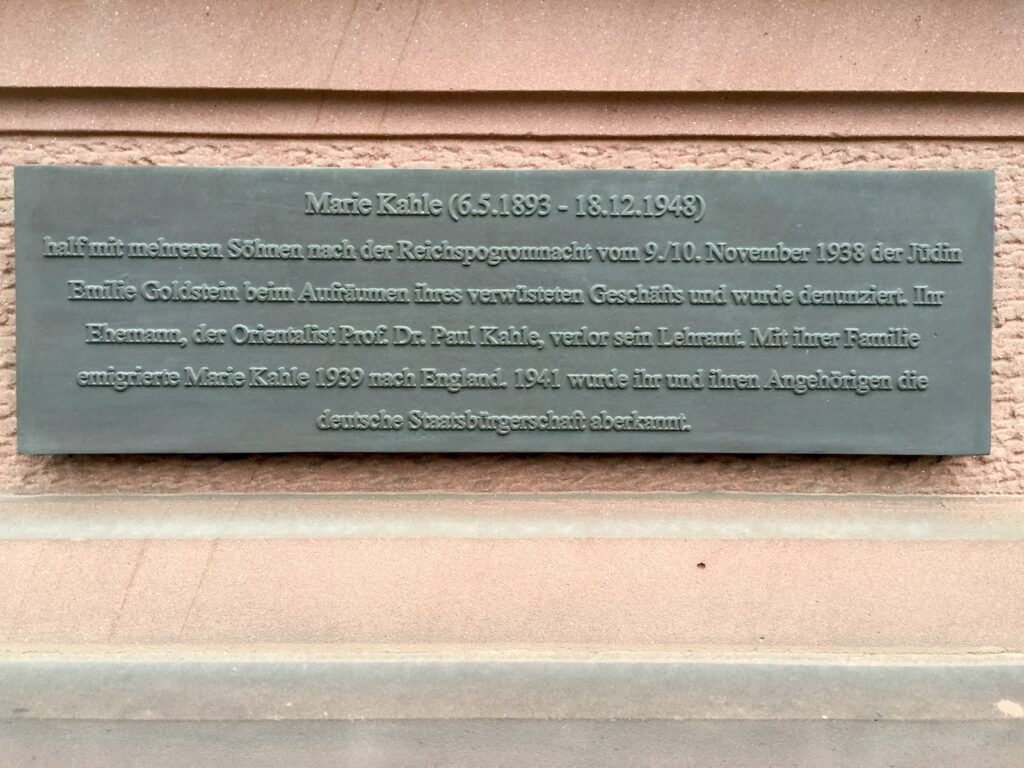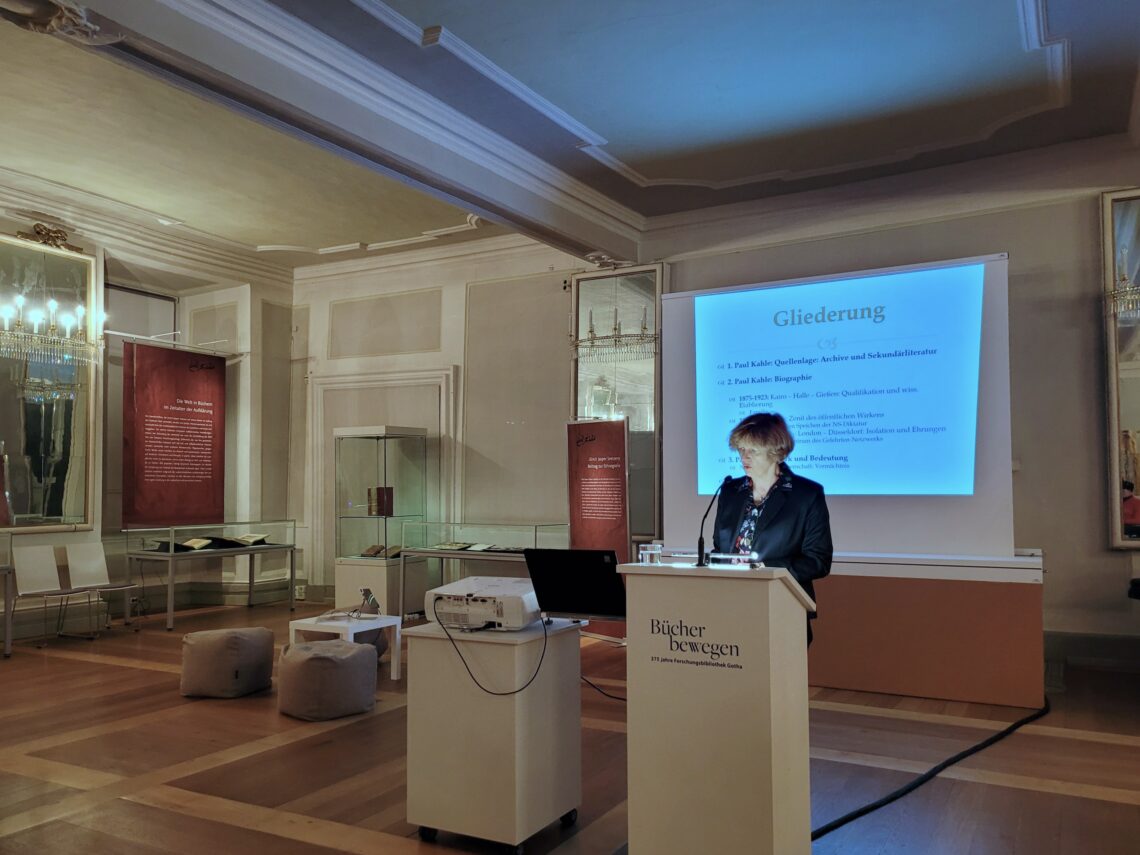Christine Schirrmacher gives a lecture at “The Orient in Gotha”
(Bonn, 17.01.2025) From September to November 2024, the Gotha Research Library of the University of Erfurt invited visitors to view 48 exhibits, mainly manuscripts, under the title “The Orient in Gotha”. With 3500 exhibits, Gotha has the third largest collection of oriental manuscripts in Germany, after Berlin and Munich. As part of the exhibition program, Prof. Dr. Christine Schirrmacher gave a lecture entitled “A Fight to the Death: The Nazi Dictatorship against the Orientalist Paul Kahle (1875–1964)” in the Mirror Hall of Friedenstein Castle on October 23, 2024.
Christine Schirrmacher has been researching Paul and Marie Kahle at the University of Bonn for several years. The Institute of Oriental and Asian Studies at the University of Bonn counts Kahle among its most important professors. Kahle also used the manuscript holdings of what is now the Gotha Research Library and thanked the Gotha librarians with a dedication in one of the books he created from them.
Paul Ernst Kahle (1875–1964) is considered one of the most important representatives of 20th-century Oriental studies. He studied theology in Halle from 1894 and worked as a pastor in Brǎila, Romania, and in Cairo for several years, but then turned entirely to research into the textual history of the Hebrew Bible and, from there, to Oriental studies. After completing his doctorate in theology and oriental studies, he was appointed to the first chair of oriental philology in Giessen in 1914, and then to Bonn in 1923.
His interests were not limited to the Arabic, Turkish and Persian language areas; in his scientific career, which spanned almost 70 years, he also studied the history of Chinese porcelain, mineralogy, shadow theater in Egypt and the search for the long-lost seafarer’s map of Christopher Columbus, parts of which he was able to rediscover in an archive in Constantinople.
In Bonn, Paul Kahle spent his most creative years as director of the Oriental Seminar from 1923, which came to an abrupt end in 1938 with the premature forced termination of his university career. Shortly thereafter, the entire Kahle family was able to flee to England, escaping the persecutors of the Third Reich at the last second. In England, Paul Kahle began a second scientific career after initial difficulties, conducted research, published, and received numerous honors before returning to Germany in 1963 and dying in 1964.
Paul Kahle’s wife Marie was a staunch opponent of the Nazi regime. After the Nazis seized power in 1933, she repeatedly stood up for Jewish fellow citizens and at times hid a Jewish student in her house. She also took in the Jewish geographer Prof. Alfred Philippson (1864–1953) and his wife when the arson attacks, pogroms and looting of Jewish shops and houses began in Bonn in early November 1938. Marie Kahle consulted Jewish doctors, long after it was no longer considered opportune to do so, and she resolutely refused to let her five sons join the Hitler Youth.

After the five synagogues in Bonn were set on fire on November 10, 1938, and the older sons of the Kahle family sought out Jewish families to hide their possessions in the Kahle house from Marie Kahle and her oldest son Wilhelm also visited the devastated corset shop of Jewish owner Emilie Goldstein in Bonn and helped her with the cleanup. A Bonn police officer recorded their names and their actions on November 17,
1938 in the “Westdeutscher Beobachter” as “betrayal of the people”. Willhelm Kahle, a student of musicology, was forcibly removed from the register of students on December 6, 1938 “for unworthy behavior on the occasion of the protest action against Jewish businesses”, which applied to all universities in Germany.
The entire family was now persecuted, harassed and threatened. A Nazi party member practically forced Marie Kahle to commit suicide and announced the physical and psychological destruction of her entire family. On the evening of March 31, 1939, Marie Kahle literally managed at the very last minute to persuade her five sons and her husband to leave for England. Only hours later, on April 1, 1939, a decree came into force that fundamentally prohibited young people who had not been members of the Hitler Youth from leaving Germany, which would have affected all five of Kahle’s sons.
Publications by Christine Schirrmacher on Marie and Paul Kahle
- Christine Schirrmacher. “Der Theologe und Orientalist Paul Kahle (1875–1964) in den Speichen der NS-Diktatur.” In: Harald Meyer, Christine Schirrmacher, Ulrich Vollmer (Hg.). Die Bonner Orient- und Asienwissenschaften: Eine Geschichte in 22 Porträts. Ostasien-Verlag: Gossenberg, 2018, pp. 85–116.
- Christine Schirrmacher. “Marie Kahle (1893–1948): Bonner Professorengattin, Pädagogin und Gegnerin des NS-Regimes.” In: Andrea Stieldorf, Ursula Mättig, Ines Neffen (Hg.). Doch plötzlich jetzt emanzipiert will Wissenschaft sie treiben. Frauen an der Universität Bonn (1818–2018). V&R Unipress: Göttingen, 2018, pp. 137–164.
- Christine Schirrmacher. “Der Geisterklub der Bonner Universität – Zirkel schwarzer Magie oder professorale Ideenbörse?” In: Jeanine Bischoff, Petra Maurer, Charles Ramble (Hg.). On a Day of a Month of the Fire Bird Year. Festschrift for Peter Schwieger on Occasion of his 65th Birthday. Lumbini International Research Institute: Bhairahawa, 2020, pp. 669–689.
- Christine Schirrmacher. Paul Kahle’s Wrong Career Choice? The Study of Theology and Service as a Pastor as Indispensable Prerequisites for Paul Kahle’s Career as a World-Class Researcher. In: Historical Interactions of Religious Cultures (HIReC) 2/2024, 1–19 (forthcoming).
Downloads and Links
- Photo 1 and photo 2: Prof. Dr. Christine Schirrmacher during her lecture © Dr. Feras Krimsti
- Photo 3: Paul Kahle’s house in Bonn © Thomas Schirrmacher
- Photo 4: Memorial plaque to Marie Kahle at the house in Bonn © Thomas Schirrmacher
- Exhibition with an accompanying program: https://uepo.de/?p=38571
- Flyer for the exhibition and the accompanying program: https://www.uni-erfurt.de/fileadmin/Bilddatenbank/Veranstaltungen/Poster_Flyer/Flyer_Ausstellung_Der_Orient_in_Gotha.pdf


